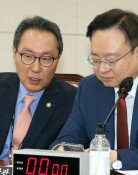Gov't should step up to support kimchi makers and farmers
Gov't should step up to support kimchi makers and farmers
Posted February. 03, 2017 08:37,
Updated February. 03, 2017 08:38
The amount of kimchi exports from local kimchi makers to China almost quadrupled to 441,000 U.S. dollars in 2016, announced the Ministry of Agriculture, Food, and Rural Affairs on Thursday. The figure is not even half the target (one million dollars) that the ministry set out earlier. Instead of making the necessary effort to identify the reasons for failure and propose an alternate plan, the ministry made the press release that it “achieved the best results ever since Korea established diplomatic ties with China in 1992 thanks to a multifaceted effort made in conjunction with the private sector.”
Since China had banned the imports of Korean kimchi in 2012, citing the colon bacillus found in the traditional fermented food of Korea, the country resumed importing kimchi from Korea after the summit meeting and free trade agreement in 2015. Last year alone, however, Korea imported as much as 121 million-dollar-worth of kimchi from China, a staggering 280 times larger than the amount of kimchi that Korea exported to China. Against this backdrop, it is quite embarrassing for the Food and Agriculture Ministry to drum up credit for such meager exports performance when the local kimchi market is practically subjugated to China. After the FTA, the tariff rate applied to Chinese kimchi fell slightly from 20 percent to 19.8 percent, but the exports expanded by more than 7 percent over a year. The word for Korean kimchi industry is doom, not a boom.
There is grave concern that the diplomatic backlash of THAAD system in Korea will affect the popular appeal of Korean business items in China, such as cosmetics, traditional ginseng chicken soup and kimchi, but the government is sitting on their hands.
With the official retaliatory steps put aside, the Korean government only takes some stalling in the customs clearance process for the Chinese government to force Korean exporters to discard their kimchi, whose shelf lives will have been expired. The Agriculture Ministry, however, released the news that local kimchi makers are elated by the strong exports, blinded by a groundless theory that kimchi, among all other foods, will somehow be an exception. Such bureaucratic PR appears to be nothing but a measure to give the sole credit to Agriculture Minister Kim Jae-soo.
The Agriculture Ministry went under fire when it made a botched response to the outbreak of avian influenza last year, being held accountable for spreading it nationwide. For Korea, kimchi is a major business item that can kill or save farmers and workers. The ministry will have to make every endeavor to devise a more substantive measure to support the private sector instead of making so much effort to glorify the minister.
Headline News
- Israel prepares for retaliation against Iran
- Samsung reclaims top spot, surpassing Apple in smartphone market
- 77% of Koreans in 20s and 30s are 'Kangaroo Tribe' due to job crisis
- KBO referees embroiled in controversy over ABS decision concealment
- Inflation, oil price surge put double shock on global economy







